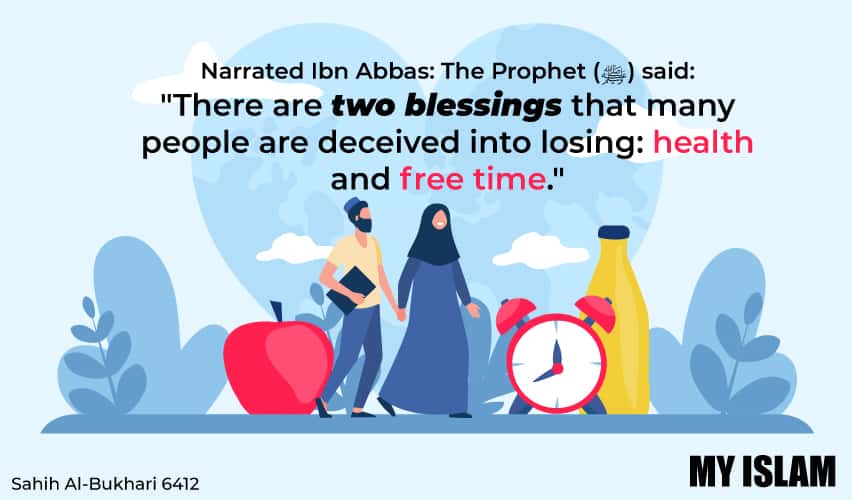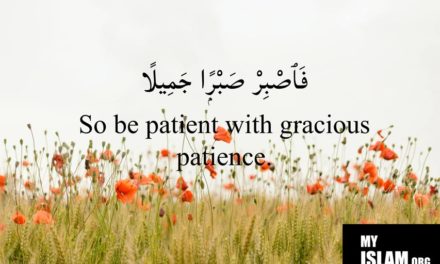
“So which of the favors of your Lord would you deny?”
Surah Rahman Ayat 13
“If you are grateful, I will surely increase you [in favor]”
Surah Ibrahim Ayat 7
2 Hadiths of Prophet Muhammad (ﷺ) on gratitude:
Narrated Ibn Abbas: The Prophet (ﷺ) said: “There are two blessings that many people are deceived into losing: health and free time.” Sahih Al-Bukhari 6412
Ibn Abbas reported: The Messenger of Allah (ﷺ) said, “Take advantage while you still have them: (i) your youth before your old age, (ii) good health before your illness, (iii) your riches before your poverty, (iv) your free time before your over-worked, (v) and your life before breathing your last.” Sahih Al-Albani in Shu’abul-Iman 9575
Practicising Gratitude
If you woke up every morning and thought to yourself how great it is you get to live another day, that you get to breathe this air, see your loved family or friends. I can guarantee that you will be happier than if you had gone without that reflection.
Nothing in your life has changed, yet you became happier.
Why is that?
That’s because when we’re taking time to be grateful to Allah (swt), it’s hard to feel anger, resentment, or fear. Your mind and attention is not fixated on what you’re lacking but seeing the many blessings you currently have.
If you’re a little pessimistic, you may say, well… this happiness doesn’t last.
That is also true.
As the day goes on, we get pulled in a hundred different directions, and our desires take control, and we lose this center of appreciation. As the hadith says, we are deceived or tricked into losing the blessing of both health and time.
This is why we must constantly engage in remembering Allah (swt) and show gratitude towards the many blessings he’s given us.
It is useful to know that at any given time we choose, we can find many things to say Alhamdulillah for. If we find our minds to have become corrupted by the events and emotions of the day, know we always have the power to regain control of our internal state.
Once we see that this life is a gift, and with it, we must accept both the good and the bad, we can control the extent to which we let the negative affect us.
But like all the great rewards of life, it takes practice and hard work.
It takes discipline and thoughtfulness to practice daily gratitude. It’s hard work to remember to say alhamdulillah and to feel a deep appreciation for things like your health, the air, and to appreciate the time we have left.
Helpful Tip:
One thing I’ve learned that’s been of immense value to me is the perception of time. Many of us believe that death is something that happens to us in the future, seeing that a person passes away at the age of 77. If your 30, that would seem like death is something 47 years away. It seems like a long time, and that’s because it is. But we don’t know what Allah (swt) has decreed for us. It’s more practical to see that every second that passes us by is a piece of us dying. That every second that escapes you is forever gone and part of history that was your existence.
People often struggle to practice gratitude but that’s because they have failed to make it a priority. You can avoid doing the same by simply scheduling a set time every day to do this practice.
The beauty of Islam is we can do this five times a day, spending a few minutes at the end of every salah to be mindful. Close your eyes, take a deep breath, and calm the noise that’s in your mind. Learn to be specific and show gratitude and thankfulness to Allah (swt) for the smallest of things.
For example, just think how crazy the microwave is – it heats food for you in 10 seconds so you don’t have to eat cold leftovers (how spoiled are you!). It’s a relatively new invention dated back to 1946, and at the time, only the rich could afford it (what a privilege!).
Homework:
Right now, find something you can be grateful for?
Really think about it, try to feel it.
Write it down.
At the end of the exercise, see if don’t you feel better.

Very inspiring.
Maa shaa Allah. Such a beautiful write-up
Alhamdulillah, great job for taking the time to share this information.
Maa Shaa ALLAAH
ALLAAH the GREAT and ALMIGHTY thanks for everything
MashaAllah thank you. I just wanted to share this…
I’m a first time mother of a 16 month old. I work part time and take my daughter with me. My husband has rotating schedule and he’s often working 12 hrs at time. My mom and sister both work. My mother in law and the rest of my husband’s family are overseas. Our daughter sleeps in our bed at night as well. She is ALWAYS with me.
The days seem long but the weeks, months have flown by. I feel lonely often and get overwhelmed, over stimulated by not having enough “me time” (alone).
However, Alhamdulillal I am truly blessed… I get to see EVERY milestone my daughter has made. I often think about how my husband has missed a few things and how sad he may feel inside because he misses her-I could never be away from her as much as he has to be! I’m blessed that my work allows me to bring my daughter to work with me 3x a week. She has her own playpen at work, toys and books. She sits on my lap while I work on the computer. I believe it’s probably pretty rare for a workplace to allow that.
I’m grateful that Allah has blessed me with so many things. Sometimes those things feel like a drag- feel overwhelming but, really Subhan’Allah I see them as blessings when I remember Allah.
For example, when she wakes at night and I lay with her until she falls asleep – I used to get upset because I would have to lay in the dark, stare at the wall… when I could be in the living room – having a breather. Now, when that happens I changed my attitude and found it as an opportunity to lay there and make dikr. Alhamdulillal.
Thank you. I have been feeling down for the past week and reading this just lightens me up. Be grateful to Allah for the smallest things. Alhamdulillah.
Jazakhum llahu khair.Masha Allah,its a beautiful inspiring piece
I am new to this and I find this very inspiring. We have to be grateful for life. And strive for better on the short time we have here. Thanks for the wise words.
Mashaa Allah
Beautifully written…most inspiring
Beautiful presentation of I have read this hadith so many times but this presentation is different and effective and more inspiring
An interesting and educative article, GRATITUDE, is good and more pleasing when practised often. Jazakallahu khaeran
Jazakallah khair,very inspiring Alhamdulillah
Alxamdullilah
I’ve to be grateful for the guidance Allah gave me to be amongst Prophet Muhammad’s (swalaLlahu a’layhi wasallama) Ummah.
This made me fell better. Shukran.
Masha Allah
Thank you for this post
I reflect I won’t say a lot cos I am still draw back to my needs and wants, but mostly whenever I think oh what I want I quickly say alhamdullilah but my problem it down es little to ease the anxiety or hopelessness in me, could it be that my alhamdullilah is just a thing of the tongue and not the heart, or is it that my heart is draw towards my prayer than my gratitude
Mashaaallah, thank you for remind me, even me I was so down,
Allhamdulillah,
shukrani jazzilah
Ya it’s an amazing. Ma shaa Allah
Asalamu Alaykum thanks for the beautiful message may Allah reward you abundantly
I am from Liberia ???????? and Africa at large
I am a living witness to the mercy and forgiveness of Allah Al AZIZ The Almighty
There came a time in my life that I almost give up on Allah but because Allah is the entirely merciful and the especially merciful that is why today I’m here writing my gratitude to Allah and I remember his goodness everyday and sit and talk by myself about the greatness of Allah Allah Azza wa jal .whenever I woke up in the morning I feel happy and grateful to the All knowing Allah the blessings that Allah have given me is so special the Lord gives me the permission to worship him and feel his presence all the time what could be grater then that I pray that Allah blessed and give everyone the opportunity to feel his presence and kindness aameen Insha Allah may Allah the everliving grant us Al jannah firdaus aameen Insha Allah Masha ???? ????
Mashaallah ❤